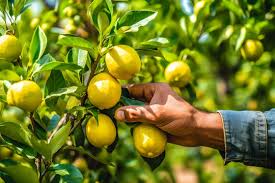![]()
If you’ve landed on this article page, you’re probably searching for a
good business idea—an idea that’s light on the pocket but heavy on
returns, promising both a fulfilling journey and potential profit.
|
How
To Start A Lucrative Lemon Farming Business In Nigeria
Lemon farming is becoming increasingly popular in Nigeria and
Africa due to the high demand for lemons and their byproducts.
Lemons are a rich source of vitamin C, citric acid, and other
nutrients, making them a valuable ingredient in many foods and
drinks, as well as in the cosmetic and pharmaceutical
industries.
Lemon can be grown under a wide range of climatic conditions.
However, too hot or too cold weather is counterproductive to
fruit size and flowering. Areas with dry climate and low
rainfall are best suited for growing Limes. Lemons can be grown
in heavy rainfall humid regions. High humidity favors the spread
of many diseases. Frost is highly injurious. Hot wind during
summer results in desiccation and drop of flowers and young
fruits. Limes are a tropical fruit.
Growing lemons requires careful planning, proper care, and
attention to detail. This step-by-step guide will walk you
through the process of lemon farming, from selecting the right
location to harvesting your fruits.
Step 1: Selecting the Right Location
Choose a location with plenty of sunlight, well-drained soil,
and protection from strong winds. Lemons thrive in warm climates
with temperatures between 70-85°F (21-29°C).
Step 2: Soil Preparation
Test the soil to ensure it has a pH level between 5.5 and 6.5,
which is optimal for lemon trees. Amend the soil with organic
matter such as compost or well-rotted manure to improve drainage
and fertility.
Step 3: Choosing Lemon Varieties
Select lemon varieties suited to your climate and growing
conditions. Common varieties include Eureka, Lisbon, Meyer, and
Femminello. Consider factors such as fruit size, flavor, and
cold tolerance when choosing varieties.
Step 4: Planting Lemon Trees
Plant lemon trees in the spring or fall, when the weather is
mild. Dig a hole twice as wide and deep as the tree’s root ball.
Place the tree in the hole, backfill with soil, and water
thoroughly. Space trees at least 10-15 feet apart to allow for
proper growth.
Step 5: Watering and Fertilizing
Water lemon trees deeply but infrequently, allowing the soil to
dry out slightly between waterings. Fertilize trees with a
balanced fertilizer formulated for citrus trees according to
package instructions, typically every 6-8 weeks during the
growing season.
Step 6: Pruning and Training
Prune lemon trees regularly to remove dead or diseased branches
and to shape the tree for optimal sunlight penetration and air
circulation. Train young trees to a central leader or
open-center shape to encourage strong, healthy growth.
Step 7: Pest and Disease Management
Monitor lemon trees for signs of pests such as aphids, scale
insects, and citrus leaf miners. Use organic or chemical control
methods as needed to manage pest infestations. Protect trees
from fungal diseases such as citrus canker and root rot by
practicing good sanitation and proper watering.
Step 8: Harvesting Lemons
Harvest lemons when they reach full size and color, typically
6-9 months after flowering. Use pruning shears to cut the fruits
from the tree, leaving a small stem attached. Store harvested
lemons in a cool, dry place for up to several weeks, or
refrigerate for longer shelf life.
When to Harvest a Lemon
Lemons are ready to pick as soon as they are yellow or yellow
green in appearance and firm. The fruit will be 2 to 3 inches in
size. It’s better to wait until they are the right size and not
worry so much about color than to wait for them to be completely
yellow. Lemons that are ready to be picked also have a slightly
glossy appearance. Lemon picking is better too early than too
late.
Limes are harvested prior to ripening, while the lime is still
green. Limes are actually yellow once fully ripe but will be
bitter and not taste very good when harvested yellow. To
determine whether a green lime is ripe enough for harvesting,
gently twist one from the stem of the lime tree and cut it open.
Harvest time is appropriate if the fruit is juicy inside.
Due to their high acidity, these citrus fruits are also
effective at killing bacteria. Because of this, a range of
citrus-based cleaning products are available, from bleaches to
surface cleaners.
Also, some studies have shown that the essential oil of Lemon
and other citrus fruits can enhance mental state through
inhalation and aromatherapy, exert antimicrobial properties, and
reduce skin inflammation through the topical application of the
peel.
lemon farming business is a lucrative venture in Nigeria and
Africa with several benefits ranging from health benefits to
economic benefits. It requires a lot of hard work and
dedication, but with the right knowledge and resources, it can
be profitable. The demand for lemon products is increasing
globally, creating an export opportunity for farmers in Nigeria
and Africa. The peak production and supply season for lemons in
Nigeria and Africa is between November to June, while the peak
demand season is during summer in Europe and North America.
Therefore, farmers should consider their target market and the
best time to export their products.
Starting a lemon farming business requires careful planning and
the right resources. Farmers must select the right type of lemon
and provide the necessary soil conditions, irrigation, and pest
control. Processing and packaging the lemons require specialized
equipment and knowledge. To sell and market their products,
farmers should consider their target customers and the various
marketing strategies available. Despite the challenges faced by
lemon farmers, the benefits of the business make it a worthwhile
investment in Nigeria and Africa.
Get our Practical Guide on Lemon farming. In this comprehensive
guide, we’ll delve into the top tips and strategies for
successful Lemon farming in Nigeria.
We will provide you with proper insight into successful Lemon
farming. This guide covers all aspects of establishing new Lemon
farms, from suitable varieties and site selection to soil
management, pest control, harvesting best practices.
|







